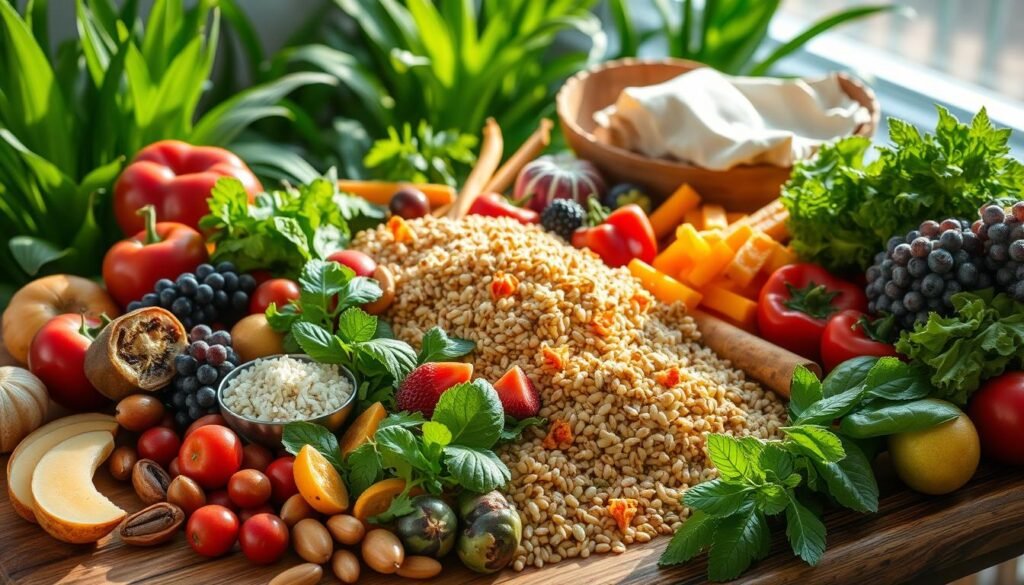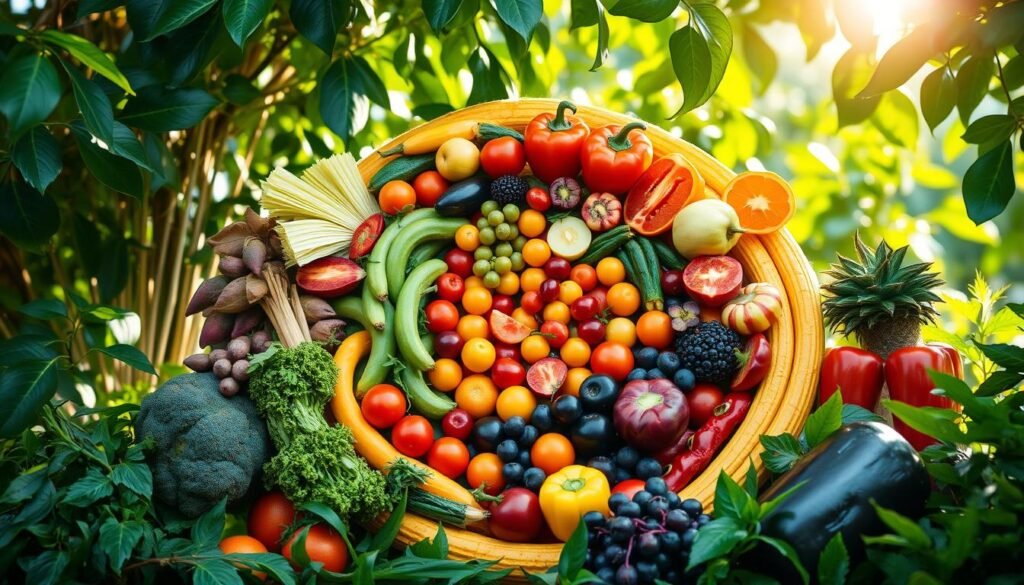Are you ready to change your health with one simple choice? What if the secret to avoiding chronic diseases and feeling better was right in front of you?
The plant-based diet is more than a trend. It’s a powerful way to improve your health from the inside out. Eating whole foods and nutrient-rich plants can lead to better wellness. It helps with metabolic issues and supports your body’s healing.
Plant-based eating can lower your risk of type 2 diabetes and improve heart health. It’s not just about food; it’s a way to live a healthier life. Eating more fiber can make your gut healthier, boosting your immune system.
Key Takeaways
- Plant-based diets offer more than just nutrition
- Whole foods are key for metabolic health
- Nutrient-rich plants can prevent chronic diseases
- Plant-based eating boosts gut health
- It makes losing weight easier
Understanding Plant-Based Diet: A Historical Perspective
Looking into the history of plant-based eating shows a rich journey. It spans human nutrition and cultural practices. Your journey into vegan lifestyle and vegetarian nutrition starts with understanding its historical roots.
Long before we knew about nutrition science, ancient civilizations valued whole foods. The Greek philosopher Pythagoras was an early supporter of plant-based diets. He advocated for them around 500 BCE.
Ancient Origins and Modern Evolution
Plant-based diets have changed a lot over the years. They’ve moved from being tied to religious beliefs to being a health choice. These changes show big shifts in culture and nutrition.
- Early vegetarian practices in Indian and Mediterranean cultures
- Buddhist influences on meat-free nutrition
- Emergence of dairy-free recipes in global cuisines
Types of Plant-Based Diets: From Vegan to Flexitarian
“Nutrition is not a one-size-fits-all approach, but a personalized journey of understanding your body’s needs.” – Dr. Jane Green, Nutritional Researcher
Today, plant-based eating comes in many forms:
- Vegan: Completely animal product-free
- Vegetarian: Includes dairy and eggs
- Flexitarian: Primarily plant-based with occasional animal products
Cultural Significance Across Civilizations
Plant-based nutrition has always been more than just food. It’s a way of life that links health, caring for the planet, and spiritual beliefs.
Studies show that people in “Blue Zones” live longer and get sick less often. They mostly eat whole, plant-based foods.
The Science Behind Plant-Based Nutrition
Looking into plant-based nutrition shows us how diet can change our health. Studies show that nutrient-rich foods and plant proteins are key to well-being.
“Food is the most powerful medicine we have access to.” – Dr. David Katz, Nutrition Expert
How well our body absorbs nutrients from plants is key. Often, our body can get nutrients from plants more easily than from animal products.
- Plant-based diets can reduce heart disease risk by up to 42%
- Vegan supplements help bridge possible nutritional gaps
- Nutrient absorption rates are best when we eat a variety of plants
Research shows big health benefits from eating plants. A 16-week study found big improvements in health, like:
| Health Metric | Improvement |
|---|---|
| Body Mass Index (BMI) | Decreased by 2.5 points |
| Visceral Fat | Reduced a lot |
| Insulin Resistance | Got a lot better |
Athletes and health fans are choosing plant proteins for good reasons. Quinoa, lentils, and chickpeas are full of protein, helping muscles grow and heal.
Starting a journey to better health with plant-based foods can make a big difference. The science is clear: making smart food choices can change your health for the better.
Essential Components of a Plant-Based Diet: From Proteins to Minerals
Creating a balanced plant-based diet needs careful planning. You start by learning about key nutrients for health and wellness. This includes vegan protein sources and meat alternatives.
Experts say adults need about 55 grams of protein a day. Plant-based foods offer many high-protein options to meet this need.
Plant-Based Protein Powerhouses
- Legumes: Beans, lentils, chickpeas
- Nuts and Seeds: Almonds, chia, hemp
- Whole Grains: Quinoa, amaranth
- Plant Proteins: Tofu, tempeh, seitan
Critical Nutrients in Plant-Based Diets
It’s important to focus on certain nutrients in plant-based diets. These include:
- Vitamin B12 (from fortified foods or supplements)
- Iron (from leafy greens and legumes)
- Omega-3 fatty acids (from flaxseeds and walnuts)
“A well-planned plant-based diet can provide all essential nutrients for optimal health.” – Nutrition Research Institute
Whole Grains and Fiber Benefits
Fiber is key for gut health. Short-chain fatty acids from fiber help with metabolism, cholesterol, and immune function.
| Nutrient | Recommended Daily Intake | Plant Source |
|---|---|---|
| Calcium | 1,000 mg | Bok choy, fortified plant milk |
| Potassium | 2,600-3,400 mg | Bananas, sweet potatoes |
By choosing a variety of plant-based proteins and knowing your nutritional needs, you can make a healthy diet. This diet supports your health and energy for the long term.
Health Benefits and Disease Prevention Through Plant-Based Living
Plant-based eating is a strong way to prevent chronic diseases and improve health. What you eat can greatly affect your health for years to come. It can help protect you from many chronic conditions.

Studies show that plant-based nutrition has many health benefits. Eating plants can help reduce inflammation. This can change your health journey for the better.
Cardiovascular Health Improvements
Heart disease is the top cause of death worldwide. Plant-based diets can greatly help protect your heart:
- Lower LDL cholesterol by up to 13%
- Reduce heart disease risk by 40%
- Help lower blood pressure naturally
Weight Management and Metabolic Benefits
Eating ethically is good for the planet and your health. Plant-based diets have great benefits for your metabolism:
| Diet Type | Average BMI |
|---|---|
| Omnivores | 28.3 kg/m² |
| Vegans | 24.1 kg/m² |
“Food can be the most powerful medicine or the slowest form of poison.” – Dr. Mark Hyman
Cancer Risk Reduction Studies
Plant-based nutrition is also good for cancer prevention. Eating whole, nutrient-rich foods can lower your cancer risk a lot.
- Eating foods rich in flavonoids may lower cognitive decline risk by 20%
- Lower metabolic syndrome risk by about 50%
- Make smart food choices to lower all-cause mortality
Start your journey to better health with plant-based nutrition.
Strategic Meal Planning for Plant-Based Success
Switching to a plant-based diet needs careful meal planning. Start your journey to better health by learning to make balanced, nutritious meals. These meals should help you reach your wellness goals.
Creating successful vegetarian meals requires smart planning and shopping. Discover how to excel in plant-based nutrition with simple tips.
Building Balanced Plant-Based Plates
To make a complete plant-based meal, mix different food groups. Your perfect meal should have:
- Lean plant proteins (beans, lentils, tofu)
- Whole grains
- Colorful vegetables
- Healthy fats from nuts and seeds
“Variety is the spice of plant-based eating” – Nutrition Experts
Shopping Lists and Pantry Essentials
For good vegetarian meal planning, fill your kitchen with key ingredients. These support vegan recipes and help with plant-based weight loss:
- Canned beans (low-sodium)
- Frozen vegetables
- Quinoa and brown rice
- Nuts and seeds
- Plant-based protein powders
Meal Prep Tips and Techniques
Good meal prep can change your plant-based life. Try batch cooking, using mason jars for salads, and prepping on weekends. This makes your weekly meals easier.
Studies show people on plant-based diets lose about 4.5 lbs (2 kg) in 18 weeks. So, planning meals well is key for keeping weight off.
Transitioning to Plant-Based Eating: A Practical Guide
Starting a plant-based lifestyle is a gradual process. It begins with small, achievable steps towards enjoying whole food meals. About 46% of Americans are now adding more plant-based meals to their diets. This shows that making the switch is both timely and possible.
“Every meal is an opportunity to nourish your body and make a positive change.” – Plant-Based Nutrition Expert
Here are some practical tips for your meatless alternatives journey:
- Start with Meatless Mondays to gradually reduce animal protein consumption
- Experiment with plant-based breakfast recipes that are quick and nutritious
- Replace meat in familiar recipes with protein-rich alternatives like tofu, tempeh, or legumes
- Explore international cuisines that naturally feature plant-based dishes
Research backs up the benefits of this change. Studies indicate that a whole food, plant-based diet can improve health. You might lose 5-10 pounds in the first month and see a 32% drop in heart disease risk.
Your pantry is essential for success. Make sure to stock up on:
- Beans and lentils
- Whole grains
- Nuts and seeds
- Plant-based protein powders
- Nutritional yeast
Remember, transitioning to a plant-based lifestyle is a personal journey. Be patient, stay curious, and enjoy finding new, healthy foods that support your health and wellness goals.
Common Challenges and Solutions in Plant-Based Eating
Switching to a plant-based diet can be tough. Many face challenges in getting enough nutrients while staying healthy. It’s key to know these hurdles to thrive on a plant-based path.
“Nutrition is not about being perfect, but about making informed choices that support your body’s needs.” – Dr. Michael Greger
Some big nutritional hurdles for plant-based folks include:
- Potential deficiencies in vitamin B-12
- Ensuring enough protein from plant sources
- Improving nutrient absorption
- Keeping the gut healthy
Vegan supplements are vital in filling these nutritional gaps. The right supplements boost nutrient absorption and cover dietary shortfalls.
| Nutrient | Plant-Based Sources | Recommended Intake |
|---|---|---|
| Vitamin B-12 | Fortified nutritional yeast, supplements | 2.4 mcg daily |
| Iron | Lentils, spinach, tofu | 8-18 mg daily |
| Calcium | Fortified plant milk, leafy greens | 1000-1200 mg daily |
To boost gut health, eat a variety of plant-based proteins and fermented foods. Probiotics and fiber-rich foods aid digestion and nutrient uptake.
Talking to a registered dietitian who knows plant-based nutrition is a good idea. They can tailor advice to meet your needs. This ensures a balanced, healthy diet.
Plant-Based Eating for Special Populations and Athletes
Athletes and special groups can do well on plant-based diets if they plan it right. Vegan protein sources are key for better performance. About 25% of top athletes are trying plant-based diets to boost recovery and performance.

Nutrient-rich foods are vital for athletes. Research shows that athletes can get enough protein from plants. Foods high in protein include:
- Legumes
- Tofu
- Tempeh
- Edamame
- Quinoa
Athletes on plant-based diets need to watch their nutrition closely. Almost 88% of trainers worldwide say plant-based fitness is top-notch. They should:
- Get regular blood tests to check nutrients
- Make sure to get enough iron and calcium
- Think about fortified foods or supplements
With the right plant-based nutrition, athletes can perform at their best and stay healthy.
| Nutritional Requirement | Plant-Based Solution |
|---|---|
| Protein Intake | 1.2-2.0g per kg body weight |
| Daily Caloric Intake | 55-60% from whole grains, legumes, fruits |
| Energy-Dense Foods | Nuts and seeds (100-200 calories per ounce) |
Plant-based diets are also good for weight loss and gut health in athletes. Research shows they can improve performance and health.
Conclusion: Embracing the Plant-Based Journey for Lasting Wellness
Starting a sustainable eating lifestyle is about understanding how plant-based nutrition affects your health and the planet. By choosing plant-based, you can lower heart disease risk by 25% and cholesterol by 40%. You might even live 3-10 years longer.
Eating ethically is more than just food choices. It’s a way to care for your body and the Earth. People who eat plants often feel better mentally, have less chronic disease, and help the environment. They use 70% less water and make 80% fewer greenhouse gases than meat eaters.
Preventing chronic diseases starts with what you eat. Even adding a few plant-based meals can change your health for the better. You might lower cancer risk by 15-20%, feel more energetic, and stay at a healthy weight.
Your health journey affects more than just you. By choosing plant-based, you show care for health, animals, and the planet. Begin with small steps, stay committed, and see how your food choices can lead to lasting wellness.




